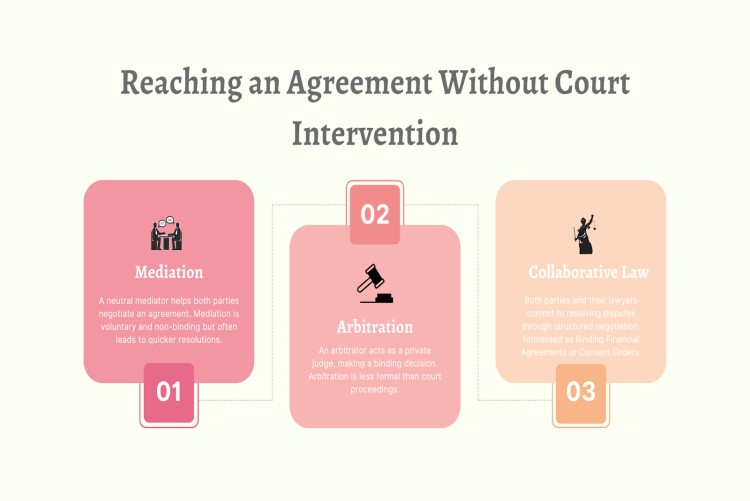
When relationships end, one of the most challenging aspects is dividing shared assets and property. While the process can seem overwhelming, understanding the basic principles of property settlements can help make this difficult time more manageable.
What is Property Settlement?
A property settlement is the legal process of dividing assets, liabilities, and financial resources between separating couples. It applies to married couples and de facto relationships, including same-sex couples.
Under Australian family law, this division of property is governed by the Family Law Act 1975.
A property settlement encompasses all assets, whether jointly or individually owned, and liabilities, such as mortgages, loans, and credit card debts. It aims to achieve a just and equitable outcome, considering the contributions and future needs of both parties.
If your settlement involves children, our guide 'Top 5 Mistakes to Avoid When Seeking a Child Custody Lawyer' provides crucial insights.
Eligibility to Apply for a Property Settlement
- Married couples must apply within 12 months of their divorce order being granted
- De facto couples must apply within 2 years of separation
- An application for filing out of time may be granted in exceptional circumstances with leave of the court
RELATED: What You Need to Know About Property Settlement After Separation
The Legal Framework for Property Settlements in Australia
Jurisdiction of the Family Law Act
Other than Western Australia, the Family Law Act of 1975 governs property settlements across Australia. For de facto relationships, the same rules apply if the relationship was for at least two years duration or involved significant financial contributions, or there is a child of the parties.
Property settlements can be finalised through:
- > An agreed settlement between the parties formalised through either a Financial Agreement or Consent Orders
- > Court proceedings, through an application to the Federal Circuit and Family Court of Australia.
Need expert property settlement lawyers in Bondi Junction, Chatswood, or Crows Nest? Matthew Buckley can guide you through your property settlement journey. From maximising your legal entitlements through mediation to providing robust advocacy in court, Matthew provides practical, clear, and cost-effective solutions tailored to your needs.
The Four-Step Process Involved in Property Settlement
Family law follows a well-established four-step process when determining property settlements. Let's examine each step in detail.
Step 1: Identifying and Valuing the Asset Pool
The first step involves creating a comprehensive list of all assets, liabilities, and financial resources, including:
- > Real estate properties
- > Vehicles and boats
- > Bank accounts and cash
- > Superannuation
- > Businesses and companies
- > Shares and investments
- > Cryptocurrencies
- > Household items
- > Personal property
- > Credit card debts
- > Mortgages
- > Personal loans
- > Tax liabilities
All assets must be valued at their current market value, and professional valuations may be necessary for significant assets like properties or businesses.
Step 2: Assessing Contributions
The court considers both financial and non-financial contributions made by each party throughout the relationship, including:
Financial Contributions:
- > Assets owned before the relationship
- > Assets acquired an income earned during the relationship
- > Inheritances and gifts
- > Financial windfalls
Non-Financial Contributions:
- > Homemaking and parenting duties
- > Property maintenance and improvements
- > Support of the other party's career
- > Care of extended family members
Step 3: Future Needs Assessment
This step considers various factors that might affect each party's future financial position:
- > Age and health status
- > Income earning capacity
- > Care responsibilities for children
- > Impact on earning capacity
- > Whether either party has repartnered
- > Financial resources
Step 4: Just and Equitable Outcome
The final step involves ensuring the proposed settlement is fair and equitable to both parties. This doesn't necessarily mean a 50-50 split but rather what's fair considering all circumstances.
Looking to formalise your agreement? Our detailed article, 'Filing Family Law Consent Orders in Australia: Step-by-Step Guide,' walks you through the entire process of making your settlement legally binding.
Looking for trusted property settlement lawyers in Rose Bay, St Leonards, or Manly? Matthew Buckley offers strategic advice and strong advocacy for all aspects of property settlements. Matthew understands the need for progressing matters whilst navigating the legal complexities to ensure you receive what you're entitled to while minimising stress and costs.
Factors Influencing Property Settlements
1. The Nature of the Relationship
The length and nature of the relationship can affect how contributions are weighted. For instance, in long-term marriages, contributions can often be considered equal, regardless of income disparities.
2. Wasteful Conduct
Deliberate actions to reduce the asset pool, such as gambling, can influence the settlement. Courts have the discretion to penalise such behaviour.
3. Superannuation Splitting
Superannuation is treated as property in Australia however it cannot be accessed until retirement age. Courts can order superannuation splitting to ensure fairness.
How To Reach an Agreement Without Court Intervention

Many couples prefer to avoid court due to costs and time. Alternative dispute resolution methods include:
1. Mediation
Mediation is a cooperative process guided by a qualified family dispute resolution practitioner who serves as a neutral third party. The mediator facilitates constructive discussions between separating couples, helping them identify core issues and explore potential solutions in a safe, structured environment. Many mediations achieve resolution costing significantly less than court proceedings.
2. Arbitration
Arbitration functions as a private court system where an experienced family law arbitrator presides over the dispute. Both parties present their evidence and arguments in a less formal setting than a courtroom, after which the arbitrator makes a binding decision that can be registered with the court. The entire process typically concludes within 1-2 days and offers substantial cost savings, usually 50-70% less than traditional court proceedings.
3. Collaborative Law
Collaborative law represents an innovative approach where both parties and their lawyers commit to resolving disputes entirely outside the court system. This process involves regular face-to-face meetings where all parties work together with relevant experts to find creative solutions that serve everyone's interests. Most collaborative law cases reach resolution within 4-8 months, and this approach often better preserves relationships between parties.
Agreements reached through any of these methods can be formalised either as Consent Orders approved by the court or as Financial Agreements drafted by lawyers and signed by both parties.
The Role of the Family Court
If an agreement cannot be reached, either party can apply to the Federal Circuit and Family Court of Australia. The court will make decisions based on the principles outlined above.
Time Limits for Applications
- > For married couples: Applications must be made within 12 months of a divorce order being granted. .
- > For de facto couples: Applications must be made within two years of separation.
How to Prepare for Property Settlement
Preparation is key to achieving a favourable outcome. Consider these steps:
- > Document all assets and liabilities. Include everything, even if it seems insignificant.
- > Seek legal advice early. Should you be contemplating separation, it is advisable to obtain legal advice without delay.
- > Maintain transparency. Hiding assets or misrepresenting facts can have legal consequences.
- > Preserve the asset pool. . It is best not to distribute assets until a formal settlement is agreed upon.
Timeline and Methods of Settlement
| Method | Description | Timeline | Cost | Key Characteristics |
| Private Agreement | Direct negotiation between parties to achieve an agreed outcome | Fastest option - can be completed within weeks | Most cost-effective - mainly legal fees for formalising agreement | • Requires good faith negotiation between parties• Must be formalised through Consent Orders or Binding Financial Agreement• Highest flexibility in outcomes |
| Mediation | Structured negotiation with an independent qualified mediator | The process can be concluded over a few months | Moderate cost - mediator fees plus legal advice | • Neutral, qualified mediator guides discussion• Non-binding. Parties retain control over decisions• Less formal than court proceedings• High success rate |
| Court Proceedings | Formal litigation through the Federal Circuit and Family Court of Australia | 12-18 months or longer | Highest cost - substantial legal fees and court costs | • Last resort option• Formal rules and procedures• Court makes final decisions• Most stressful approach |
Make your search for legal representation easier. 'Top 10 Questions to Ask Before Hiring a Family Lawyer' helps you identify the right family lawyer who truly understands your needs and situation.
Common Challenges in Property Settlements
1. Hidden Assets
Some parties may attempt to conceal assets to gain an advantage. Legal remedies, such as subpoenas or forensic accountants, can uncover hidden property.
2. Valuation Disputes
Disagreements over asset valuations can complicate negotiations. Engaging an independent valuer is often necessary.
3. Emotional Strain
Dividing assets while undergoing separation can take a significant emotional toll. Obtaining legal representation that you trust can alleviate this burden.
Common Myths and Misconceptions
Myth 1: Assets Are Always Split 50-50
Reality: There is no automatic entitlement to a 50-50 split. The division depends on the specific circumstances of each case and the application of the four-step process.
Myth 2: The Party at Fault Gets Less
Reality: The court does not consider who was "at fault" for the relationship breakdown when determining property settlements.
Myth 3: Everything Must Go Through Court
Reality: Many couples successfully negotiate property settlements through mediation or collaborative law processes without the need of court intervention.
Frequently Asked Questions about Property Settlements
1. Do we need to go to court to finalise the property settlement?
No. Many couples resolve property settlements through mutual agreement or alternative dispute resolution. Court intervention is a last resort.
2. Can we divide property without legal advice?
Dividing assets without seeking legal advice is unwise. Obtaining legal advice ensures your agreement is fair, lawful, and enforceable.
3. What happens if one party refuses to negotiate?
In these circumstances, the best strategy is to propose mediation. However, if the other party is not prepared to mediate, it is advisable to file proceedings with the court without delay. The court will ensure a fair division of assets based on the principles of family law.
Why Choose Mathew Buckley for Your Property Settlement?
Property settlements are inherently complex, but with expert guidance, you can navigate the process with confidence. Mathew Buckley specialises in family law and understands the intricacies of dividing matrimonial assets. Matthew Buckley can
- > Guide you through the entire settlement process
- > Provide expert legal advice tailored to your situation
- > Help negotiate a fair outcome and maximise your entitlements
- > Represent you at a mediation
- > Provide robust advocacy in court and Ensure your rights and interests are protected
Matthew is dedicated to achieving a fair outcome for you while minimising conflict. Matthew can help you secure your financial future.
If you need assistance with dividing matrimonial property, don’t leave your financial future to chance. Contact Matthew Buckley for expert advice and support. Matthew is here to guide you through every step of the way.
Get in touch today to schedule a consultation.







